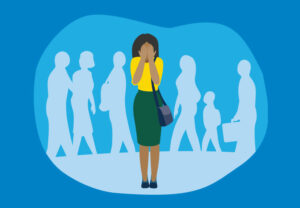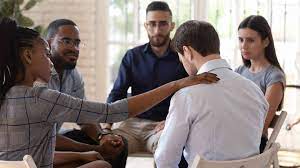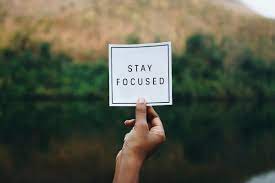Social phobia, also known as social anxiety disorder, is a mental health condition that involves intense fear and self-consciousness in social situations. People with social phobia often worry that they will say or do something embarrassing or humiliating. This can lead to avoidance of social situations, which can severely impact the quality of life. In this blog post, we will discuss the signs and symptoms of social phobia, as well as treatment options.
Contents
What Is Social Phobia?
 Social phobia is an intense fear of social situations that can involve anything from talking to people you don’t know, to public speaking, to eating in front of others. For people with social phobia, even everyday activities like going to work or school can be a challenge.
Social phobia is an intense fear of social situations that can involve anything from talking to people you don’t know, to public speaking, to eating in front of others. For people with social phobia, even everyday activities like going to work or school can be a challenge.
In fact, it is believed that social phobia is the third most common mental disorder in the United States, with an estimated 15 million adults affected. And while it can develop at any age, social phobia usually begins in adolescence or young adulthood. Because it is often seen as a “shyness” or “nervousness,” social phobia can be difficult to diagnose.
If we talk about the prevalence of social phobia, it is more common in women than men. But, men and women tend to experience different types of social anxiety. For example, women are more likely to be afraid of social situations that involve judgment or criticism (such as public speaking).
While men are more likely to be afraid of physical activities (such as sweating or getting dizzy). It is believed around 30% of people with social phobia also have a specific phobia (or phobias), such as a fear of flying, heights, or snakes. So, it is important to understand that social anxiety is not just “shyness.” It is a real and serious mental disorder that can have a profound impact on a person’s life.
Some examples
For a clear understanding, let’s explore some examples of social phobia.
Suppose you’re at a party. You don’t know anyone and feel very uncomfortable. Your heart races, your hands started to sweat, and you feel like you’re going to faint. These are all physical symptoms that can occur when someone has a social anxiety disorder or social phobia.
Now suppose you’re in a meeting at work. You’re asked to give a presentation. Even though you’ve prepared well, your mind goes blank and you start to shake. Your heart races and you feel like everyone in the room can see how nervous you are. These are all physical symptoms that can occur when someone has a social anxiety disorder or social phobia.
These are just two examples of how social anxiety can manifest itself. It’s important to remember that everyone experiences anxiety in different ways and to different degrees. Just because you have some of the symptoms described above does not necessarily mean you have social phobia. Only a qualified mental health professional can give you a diagnosis.
What Are The Symptoms To Identify?
 There are many symptoms that come with social phobia. It is important to note that not everyone experiences all the symptoms. The list below contains some of the more common ones:
There are many symptoms that come with social phobia. It is important to note that not everyone experiences all the symptoms. The list below contains some of the more common ones:
- Intense fear of being watched and judged by others
- Avoiding social situations
- Feeling very self-conscious in front of others
- Difficulty making eye contact
- Blushing, sweating, or trembling
- Nausea or other gastrointestinal distress
- Rapid heartbeat, shortness of breath, or dizziness.
It is believed that the symptoms of social phobia can be triggered by a variety of things. So it is important to observe the symptoms in order to get an accurate diagnosis. If you or someone you know is exhibiting these symptoms, it is important to seek professional help.
What Triggers Social Phobia?
There are several causes and triggers of social anxiety disorder or social phobia. It may be caused by a traumatic experience in the past, such as bullying or teasing. It may also run in families, which suggests that it may be due to genetic factors. Social phobia may also be caused by chemicals in the brain or imbalances in neurotransmitters.
So these causes can be broadly divided into three categories: psychological factors, family history or biology, and life events. It’s important to remember that social anxiety disorder is not caused by one single factor. It is likely a combination of several factors that play a role in the development of the condition.
Some of the more common triggers include:
- Being the center of attention
- Having to speak in front of others
- Being introduced to new people
- Dating or other romantic situations
- Eating or drinking in front of others.
These are only some of the situations that may trigger social anxiety disorder. It is important to remember that not everyone who experiences these triggers will develop social phobia. Conversely, people with a social anxiety disorder may be triggered by situations that other people find relatively innocuous.
If you think you might have a social anxiety disorder, it is important to seek professional help. A mental health professional can help you to understand your symptoms and develop a treatment plan. Treatment may include cognitive-behavioral therapy, medication, or a combination of the two. With treatment, most people with social anxiety disorder can learn to manage their symptoms and live fulfilling lives.
Is Social Phobia Same As Anxiety?
 There are a lot of people who think that social phobia is just another term for anxiety. While it is true that social phobia is a form of anxiety, there are some key differences between the two.
There are a lot of people who think that social phobia is just another term for anxiety. While it is true that social phobia is a form of anxiety, there are some key differences between the two.
Social phobia is characterized by a fear of social situations where one may feel exposed to possible scrutiny by others. This can lead to avoidance of certain situations, or enduring them with intense anxiety.
Another difference between social phobia and anxiety is that social phobia is often focused on a specific situation, such as public speaking, while anxiety can be more general.
Some other differences include:
- Social phobia usually starts in adolescence or young adulthood, while anxiety can start at any age.
- People with social phobia are more likely to have other mental health conditions such as depression or substance abuse.
- Social phobia is more common in women than men, while anxiety is about equally common in both sexes.
If you think you may have social phobia, it is important to seek treatment. There are several effective treatments available that can help you. With treatment, people with social phobia can lead normal, healthy lives.
How Does It Impact Life?
It is estimated that 15 million American adults suffer from social phobia. This means that about of the US population experiences significant fear and anxiety in social situations. And around the globe, it is thought that 160 million people suffer from this disorder. That is a lot of people who go through life feeling anxious and stressed in social situations, which can have a serious impact on their quality of life.
So, here are some of the common consequences that social phobia can have:
- People with social phobia often miss out on important life events, such as weddings or parties, because they are too anxious to attend.
- They may also miss out on work opportunities or promotions because they are too anxious to attend work functions or networking events.
- They may avoid social activities altogether, which can lead to feelings of isolation and loneliness. Because they might not go out, they might not meet new people and make new friends.
- People with social phobia may turn to alcohol or drugs to try to ease their anxiety, which can lead to substance abuse problems.
- They may also have difficulty maintaining relationships because of their fear of social situations.
- And, they may suffer from anxiety or depression as a result of their social phobia.
It is believed that the complications of social phobia can even lead to suicide in some extreme cases. So, as you can see, social phobia can have a serious impact on someone’s life if it is not treated. If you think you might be suffering from social phobia, please reach out for help.
There are many resources available to you. Please don’t suffer in silence. And, if you know someone who you think might be suffering from social phobia, please reach out to them and offer your support.
How To Diagnose It?
 The diagnosis of social anxiety disorder, or social phobia, can be made by a mental health professional. He or she will ask about your symptoms and when they began. A physical exam may also be done to rule out other conditions that may cause similar symptoms.
The diagnosis of social anxiety disorder, or social phobia, can be made by a mental health professional. He or she will ask about your symptoms and when they began. A physical exam may also be done to rule out other conditions that may cause similar symptoms.
Moreover, there are other methods to diagnose a social phobia. For example, a professional may ask you to keep a record of your daily activities, thoughts, and feelings. He or she may also ask you to undergo a psychological evaluation. This assessment may include questions about your family history and any past experiences that may have caused anxiety.
A diagnosis of social phobia is generally made when someone has intense fear or anxiety about one or more social situations. These fears or anxiety must interfere with daily functioning and cause significant distress. For example, someone with a social phobia may avoid going to work or school because they fear meeting new people.
If you think you may have a social anxiety disorder, talk to a mental health professional. They can help you find the best treatment for you.
Can Social Phobia Be Treated?
 The complete treatment and cure for social phobia are still unknown. However, there are many treatments available that can help lessen the symptoms. So here are a few options to explore if you think you’re suffering from social phobia.
The complete treatment and cure for social phobia are still unknown. However, there are many treatments available that can help lessen the symptoms. So here are a few options to explore if you think you’re suffering from social phobia.
Cognitive behavioral therapy
This type of therapy helps identify the thoughts and behaviors that contribute to your anxiety. Once these are identified, you and your therapist can work on changing them. CBT aims at helping you develop new, healthier coping mechanisms. It is believed that people who consider and practice CBT techniques see the most improvement. Because it challenges the negative thoughts and ideas that feed into social anxiety.
Exposure therapy
This is a type of CBT that involves gradually exposing you to the situations you fear. This can be done in imagination first, then in real life with the help of a therapist. Eventually, you should be able to do it on your own. For example, when you’re afraid of public speaking, you might start by imagining yourself giving a speech. Then you would work your way up to giving a speech in front of one person. And finally, in front of a group.
Medication
There are several types of medication that can be used to treat social anxiety disorder. The most common are:
- Antidepressants
- Beta-blockers
- Anti-anxiety medications.
Antidepressants help by changing the way the brain uses certain chemicals. This can help reduce anxiety symptoms. Beta-blockers work by blocking the effects of adrenaline. It helps in situations where the anxiety is caused by physical symptoms like trembling or a rapid heartbeat. Anti-anxiety medications help by reducing anxious feelings and making it easier to cope with anxiety-producing situations.
Support groups
 This is one form of treatment that can be very helpful. Because support groups provide you with a safe place to share your experiences and feelings, they can be very beneficial. Additionally, support groups are led by trained facilitators who can offer guidance and advice. If you’re interested in finding a social phobia support group near you, then google some of the best options for you.
This is one form of treatment that can be very helpful. Because support groups provide you with a safe place to share your experiences and feelings, they can be very beneficial. Additionally, support groups are led by trained facilitators who can offer guidance and advice. If you’re interested in finding a social phobia support group near you, then google some of the best options for you.
Social phobia can be a debilitating disorder. But there are treatments available that can help lessen the symptoms. If you think you might be suffering from social phobia, talk to your doctor about the best treatment option for you.
Do Self-Help Techniques Work?
Sometimes people with social anxiety are interested in self-help techniques but wonder if they actually work. The answer is that it depends on the person. Some people find that self-help techniques are very helpful, while others find them to be not so helpful.
It really depends on the individual and what he or she is comfortable with. Some common self-help tips include:
Control breathing
When you are anxious, your breathing quickens and becomes shallow. This can make you feel lightheaded and dizzy. Try to control your breathing by taking slow, deep breaths. You can also do this through relaxation techniques such as yoga or meditation.
Visualize success
One way to ease your anxiety is to visualize yourself in the situation you are worried about, but this time succeeding. For example, if you have a fear of public speaking, picture yourself giving a great speech and receiving applause afterward. This will more likely happen if you have prepared well and practiced beforehand.
Talk to someone who understands
It can be helpful to talk to someone who understands social anxiety and has gone through similar experiences. This could be a friend, family member, therapist, or counselor. Talking to someone who gets it can help you feel less alone and give you some good tips on how to cope.
Exercise
Exercise can help reduce stress and anxiety. It also releases endorphins, which have mood-boosting effects. A moderate amount of exercise is the key to managing stress levels. Because it works so well, some people with social anxiety use exercise as their main form of treatment.
Challenge negative thoughts
Your mind may be filled with negative thoughts about yourself and the situation. Challenge these thoughts by asking yourself if they are really true. Also, you may want to try to reframe the situation in a more positive light. For example, if you are worried about going to a party, tell yourself that it will be a good opportunity to meet new people.
Keep a journal
Journals are a very effective way of managing social anxiety. This is because they help to track your progress, document any improvements, and identify any potential triggers. Journals can also be a form of self-care, providing a space for you to vent about your day-to-day struggles with social anxiety.
Stay calm and focus
 When you have a social phobia, it can be tough to stay calm and focused. That’s because you’re constantly worrying about what other people think of you. This can make it hard to concentrate on anything else. So try to stay calm and focus on the task at hand. This will help you feel more confident and in control.
When you have a social phobia, it can be tough to stay calm and focused. That’s because you’re constantly worrying about what other people think of you. This can make it hard to concentrate on anything else. So try to stay calm and focus on the task at hand. This will help you feel more confident and in control.
These are some common self-help tips that can help you manage your social phobia. You should always prioritize your self-care because it’s essential to your well-being. If you’re feeling overwhelmed, talk to a therapist or counselor who can help you develop healthy coping mechanisms. There are always resources available to help you manage your social phobia. Seek out the help you need to feel better and live a more fulfilling life.
Conclusion
To conclude, social phobia is actually a situation where a person is excessively worried about being judged by others or embarrassed in social situations. It can be a debilitating condition, but there are treatments available that can help. You should never forget that you are not alone in this and that there is always help available.
If you think that you might have social phobia, or if you know someone who does, the first step is to talk to a doctor or mental health professional. They can help diagnose the condition and develop a treatment plan. Don’t suffer in silence—reach out for help today.
This article is intended to be a general overview of social phobia and is not meant to replace professional medical advice. For more information and professional guidance, please contact Therapy Mantra. Here, the team of professional therapists can provide you with the support and guidance you need to recover from this condition. Contact us today to learn more about our services. You can also book an online therapy session or download our free Android or iOS app.


